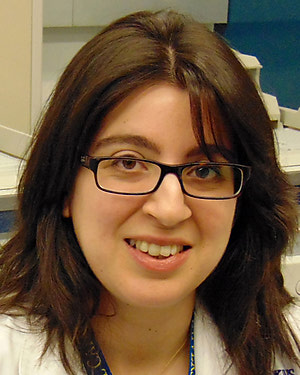Research Lab Results
-
Mary Fissell Lab
Research in the Mary Fissell Lab looks at the ways in which average people in early modern England understood health, healing and the natural world. In an ongoing study of vernacular knowledge (ideas about the natural world that ordinary people created, shaped and used), we are examining the popular medical book Aristotle's Masterpiece, first published in 1684. Research has also focused on health care for the poor in 18th-century urban Britain and on how ordinary people learned about their bodies from inexpensive print publications.
-
Molecular Oncology Laboratory
Our Molecular Oncology lab seeks to understand the genomic wiring of response and resistance to immunotherapy through integrative genomic, transcriptomic, single-cell and liquid biopsy analyses of tumor and immune evolution. Through comprehensive exome-wide sequence and genome-wide structural genomic analyses we have discovered that tumor cells evade immune surveillance by elimination of immunogenic mutations and associated neoantigens through chromosomal deletions. Additionally, we have developed non-invasive molecular platforms that incorporate ultra-sensitive measurements of circulating cell-free tumor DNA (ctDNA) to assess clonal dynamics during immunotherapy. These approaches have revealed distinct dynamic ctDNA and T cell repertoire patterns of clinical response and resistance that are superior to radiographic response assessments. Our work has provided the foundation for a molecular response-adaptive clinical trial, where therapeutic decisions are made not based on imaging but based on molecular responses derived from liquid biopsies. Overall, our group focuses on studying the temporal and spatial order of the metastatic and immune cascade under the selective pressure of immune checkpoint blockade with the ultimate goal to translate this knowledge into “next-generation” clinical trials and change the way oncologists select patients for immunotherapy.
-
Michael Kornberg Lab
Our laboratory conducts basic and translational research aimed at better understanding the pathogenesis of multiple sclerosis (MS) and the role of the immune system in CNS disease, particularly the processes that drive progressive disability such as neurodegeneration and remyelination failure. We currently have three parallel research programs: 1. Metabolism as a modulator of MS: We are studying how basic metabolic pathways regulate the immune system and how these pathways might be exploited to protect neurons and myelin-forming oligodendrocytes from injury. 2. Identifying pathways by which nitric oxide (NO) and other free radicals cause neuronal and axonal damage. Our lab is identifying specific signaling pathways initiated by NO and other free radicals that can be targeted by drugs to produce neuroprotection. 3. Modulating the innate immune system in MS: In collaboration with others at Johns Hopkins, we are studying ways to enhance the reparative functions of microglia while preventing maladaptive responses. This work has identified bryostatin-1 as a potential drug that may be re-purposed for this task. -
MRB Molecular Imaging Service Center and Cancer Functional Imaging Core
Established in 2004, the MRB Molecular Imaging Service Center and Cancer Functional Imaging Core provides comprehensive molecular and functional imaging infrastructure to support the imaging research needs of the Johns Hopkins University faculty. Approximately 55-65 different Principal Investigators use the center annually. The MRB Molecular Imaging Service Center is located behind the barrier within the transgenic animal facility in the basement of MRB. The MRB location houses a 9.4T MRI/S scanner for magnetic resonance imaging and spectroscopy, an Olympus multiphoton microscope with in vivo imaging capability, a PET-CT scanner, a PET-SPECT scanner, and a SPECT-CT scanner for nuclear imaging, multiple optical imaging scanners including an IVIS Spectrum, and a LI COR near infrared scanner, and an ultrasound scanner. A brand new satellite facility in CRB2-LB03 opens in 2019 to house a simultaneous 7T PET-MR scanner, as well as additional imaging equipment, to meet the growing molecular and functional imaging research needs of investigators. To image with us, MRB Animal Facility training and Imaging Center Orientation are required to obtain access to the MRB Animal Facility and to the MRB Molecular Imaging Center (Suite B14). The MRB Animal Facility training group meets at 9:30 am on Thursdays at the Turner fountain/MRB elevator lobby. The Imaging Center orientation group meets at 1 pm on Thursdays at the Turner fountain, and orientation takes approximately 30 min. Please keep in mind that obtaining access to both facilities requires time, so please plan in advance. -
Timothy Niessen Lab
The Timothy Niessen Lab studies patient outcomes in the ICU. We are particularly interested in the effects of sleep quality, delirium transitions and sedation on the improvement of intensive care patients. Our investigators also focus on the practices of internal medicine interns, studying the variability of hand washing hygiene, etiquette-based communication and time spent in direct and indirect patient care. We have also studied the onset of myelopathy as a result of B12 deficiency from long-term colchicine treatment and recreational nitrous oxide use.
-
The Laboratory for Precision Immunology
We are devoted to developing and deploying cutting edge technologies that can be used to define human immune responses. Much of our work leverages ‘next generation’ DNA sequencing, which enables massively parallel molecular measurements. Examples of our technologies include: - bacteriophage display of synthetic peptidome libraries for comprehensive, quantitative profiling of antibodies; - display of ORFeome libraries for antigen discovery, protein-protein interaction studies, and drug target identification; - ultrasensitive, multiplex RNA quantification techniques to monitor gene expression and detect microbes; - pooled genetic screening to elucidate immune cell function and identify new therapeutic targets. The Larman Laboratory uses these and other approaches to identify opportunities for monitoring and manipulating immune responses. -
Todd Dorman Lab
Research conducted in the Todd Dorman Lab examines the use of informatics in intensive care settings as it relates to remote patient monitoring, safety and management strategies. Specific areas of interest include the surgical stress response; aminoglycoside antibiotics; fungal infections; renal failure; pharmacokinetic models of drug administration; and ICU triage and its impact on disaster preparedness.
-
Tom Woolf Lab
The Tom Woolf Lab studies the quarter of the genome devoted to membrane proteins. This rapidly growing branch of bioinformatics, which includes computational biophysics, represents the main research direction of our group. We aim to provide insight into critical issues for membrane systems. In pursuit of these goals, we use extensive computer calculations to build an understanding of the relations between microscopic motions and the world of experimental measurements. Our calculations use our own Beowulf computer cluster as well as national supercomputer centers. An especially strong focus has been on the computed motions of proteins and all-atom models of the lipid bilayers that mediate their influence. To compute these motions, we use the molecular dynamics program CHARMM. We hope to use our understanding of the molecular motions for the prediction of membrane protein structures using new computational methods. -
Robert H. Brown Lab
Work in the Robert H. Brown Lab explores several topics within pulmonary physiology, with a long-term goal of understanding the structural changes in the lungs that lead to the pathophysiology of lung disease. Our core studies examine the structure-function relationship of pulmonary airways and vessels as well as their role in chronic obstructive pulmonary disease (COPD) and reactive airway disease. Recent research has involved studying the mechanisms and treatment of COPD progression, new methods for treating asthma, and lung inflation and airway hyperresponsiveness. We are also exploring the impact of HIV infection on the etiology of lung disease and the pathophysiologic consequences of lung distention. -
Robert Greenberg Lab
Researchers in the Robert Greenberg Lab examine anesthesiology and critical care-related topics that include critical airway management, non-invasive fetal monitoring, neural blockade monitoring, pediatric acute pain management, cuffed oropharyngeal airway (COPA), pain informatics, and pediatric pain education and innovation.



